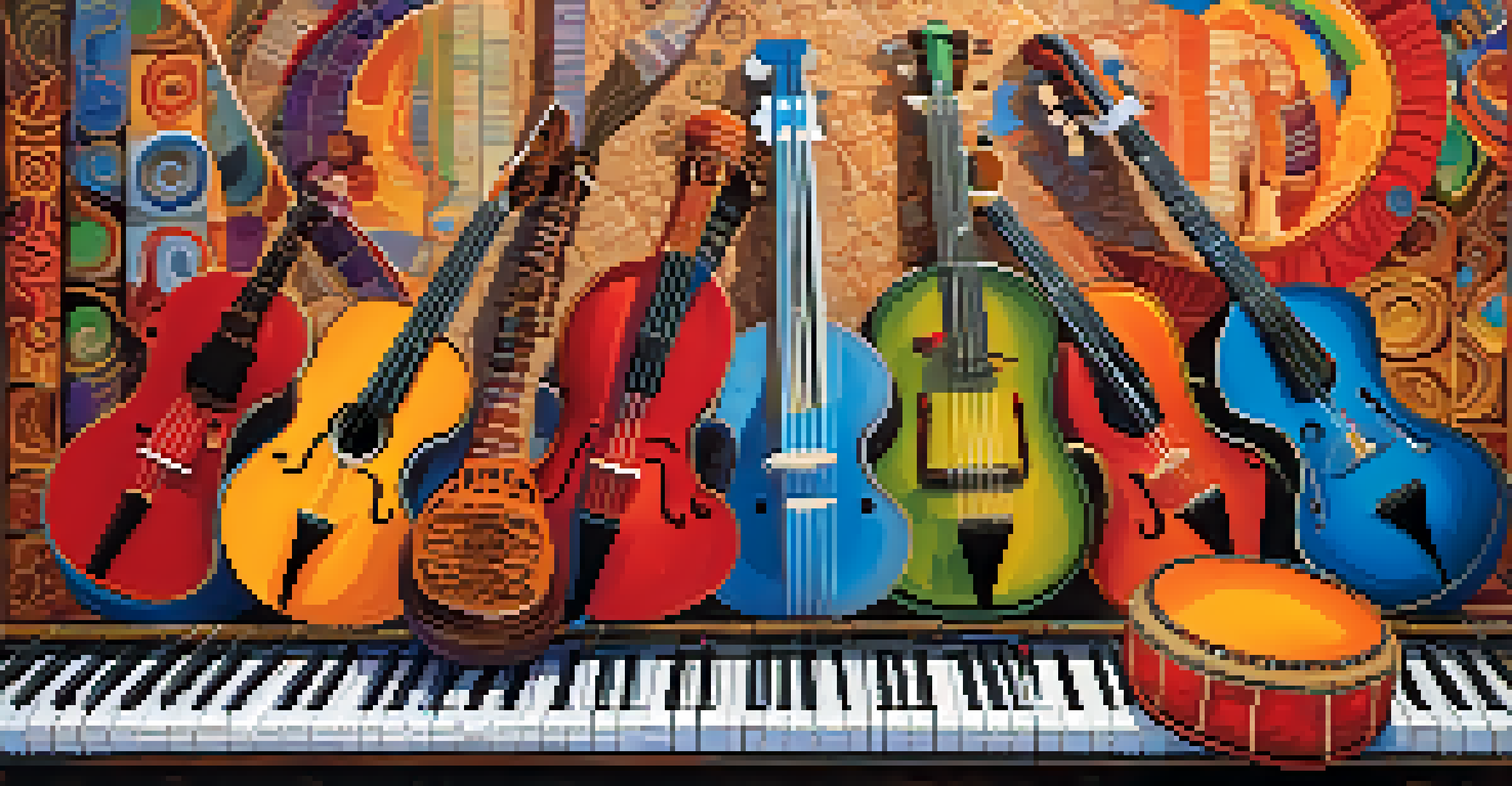How Music Activates the Brain's Memory Networks

The Connection Between Music and Memory
Music has a fascinating link to memory; it can trigger vivid recollections and emotions. For many people, a particular song can instantaneously transport them back to a specific moment in their lives. This deep connection arises from the brain's intricate wiring, where music engages multiple areas associated with memory processing.
Music can change the world because it can change people.
Studies show that when we listen to music, our brains activate regions responsible for memory formation, particularly the hippocampus. This area is crucial for converting short-term memories into long-term ones. Therefore, music serves as a powerful cue, helping to retrieve information that might otherwise remain buried within our minds.
Moreover, music can enhance memory retention, making it easier to learn new information. For example, students often use melodies or rhymes to memorize facts, demonstrating how music can serve as an effective mnemonic device.
How Music Stimulates Brain Activity
Listening to music activates a wide array of brain regions, including those linked to emotion, reasoning, and motor skills. This multi-dimensional activation can improve overall cognitive function, making tasks like memorization easier. The rhythm and melody of music can also stimulate brain waves, further enhancing its impact on memory.

Research suggests that upbeat music can boost dopamine levels, the neurotransmitter responsible for feelings of pleasure and reward. This increase in dopamine not only uplifts our mood but also enhances our ability to learn and memorize information. Essentially, the more we enjoy the music, the more effective it becomes as a memory tool.
Music Enhances Memory Recall
Listening to music activates brain regions responsible for memory, making it a powerful cue for retrieving information.
Additionally, music's structure and patterns can help our brains organize information. Just as we group similar items to remember them better, music allows us to create links between concepts, making recall more intuitive and accessible.
The Role of Emotion in Musical Memory
Emotion plays a pivotal role in how music affects memory. When music evokes strong feelings, it can create lasting memories that are easier to recall. For instance, a song associated with a significant life event often becomes ingrained in our minds due to the emotional weight it carries.
The music is not in the notes, but in the silence between.
The amygdala, a brain region involved in processing emotions, works closely with the hippocampus to form these emotional memories. This collaboration means that songs tied to emotional experiences can trigger vivid recollections long after they occurred. In this way, music becomes a powerful vessel for our personal histories.
Moreover, the emotional context of music can enhance our ability to learn new information. When we associate positive feelings with educational content, we are more likely to remember that information later. This explains why many people find it easier to learn with music playing in the background.
Music Therapy and Memory Rehabilitation
Music therapy has emerged as a valuable tool in memory rehabilitation, particularly for individuals with Alzheimer’s or dementia. This therapeutic approach harnesses familiar tunes to stimulate memory and emotional responses, often leading to remarkable improvements in cognitive function. It’s not uncommon for patients to recall names and events when they hear their favorite songs.
Therapists utilize music to bridge communication gaps, helping patients express themselves more freely. By creating a non-threatening environment, music therapy fosters connections that might otherwise be lost. This not only aids memory recall but also enhances overall quality of life for individuals facing memory challenges.
Emotion Strengthens Musical Memories
Songs tied to emotional experiences create lasting memories, as the brain's emotional centers collaborate with memory processing regions.
The success of music therapy highlights the profound impact music can have on the brain's memory networks. As research continues to uncover these benefits, more healthcare professionals are integrating music into treatment plans, promoting a holistic approach to memory care.
The Science Behind Musical Memory Recall
The science behind musical memory recall is rooted in the brain's complex neural pathways. When we hear a song, our brains activate networks that link auditory processing to memory storage. This interconnectedness means that music can serve as a powerful cue, triggering memories with remarkable clarity.
Neuroscientific studies reveal that listening to music can enhance synaptic plasticity, the brain's ability to change and adapt. This adaptability is crucial for learning and memory retention, suggesting that music not only helps us recall memories but also aids in forming new ones. Essentially, music creates a fertile ground for memory development.
Furthermore, the patterns and structures found in music can facilitate the encoding of memories. When we engage with music, whether by listening or playing an instrument, we stimulate various cognitive processes that enhance our ability to remember. This makes music an invaluable tool for anyone looking to improve their memory.
Cultural Influences on Musical Memory
Cultural background significantly shapes our musical preferences and, consequently, our memory associations with different tunes. Specific songs may evoke unique memories for individuals based on their cultural experiences, highlighting how music can be a universal language while also being deeply personal. This interplay between culture and memory enriches our understanding of music's role in our lives.
For example, traditional songs passed down through generations often carry historical significance, linking listeners to their heritage. When we hear these songs, they can trigger memories of family gatherings, festivals, or milestones, making them powerful memory aids. Thus, music becomes a bridge connecting us to our past.
Music Therapy Aids Memory Recovery
Music therapy effectively helps individuals with memory challenges, like Alzheimer's, by stimulating recall and enhancing communication.
Moreover, the cultural context of music can influence how we process and remember information. Different styles, rhythms, and lyrics may resonate more deeply with individuals, enhancing their engagement and retention. This highlights the importance of considering cultural influences when exploring the relationship between music and memory.
Practical Tips for Using Music to Boost Memory
Incorporating music into your daily routine can significantly enhance your memory recall. One effective strategy is to create playlists that align with specific activities or subjects you want to remember. For instance, listening to classical music while studying can create a conducive environment for learning, making it easier to absorb information.
Another approach is to use songs with lyrics that relate to the material you're trying to memorize. By turning facts or concepts into a catchy tune, you can create stronger memory associations. This technique is especially helpful for students, as it transforms study sessions into enjoyable and productive experiences.

Lastly, make it a habit to revisit songs that hold personal significance. Whether it's a favorite childhood song or a tune from a special event, regularly engaging with these melodies can keep memories alive and even enhance cognitive functions. By weaving music into your life, you can tap into its incredible power to boost memory.